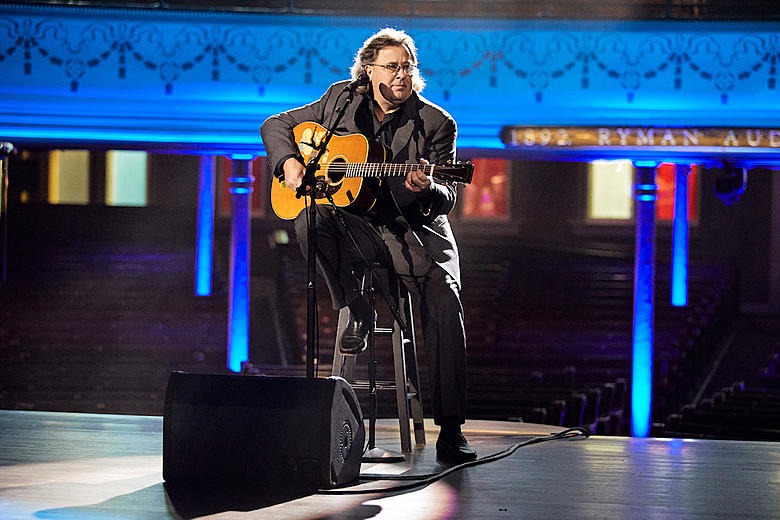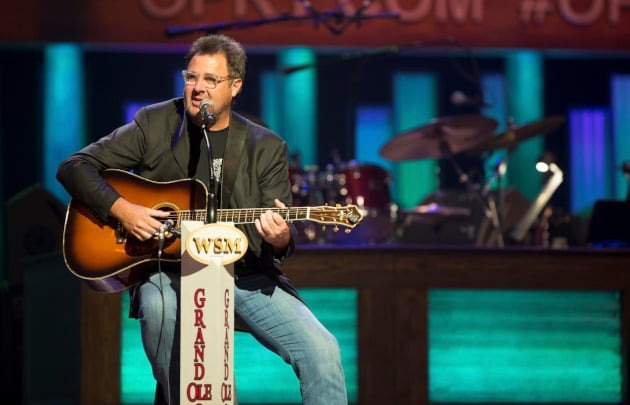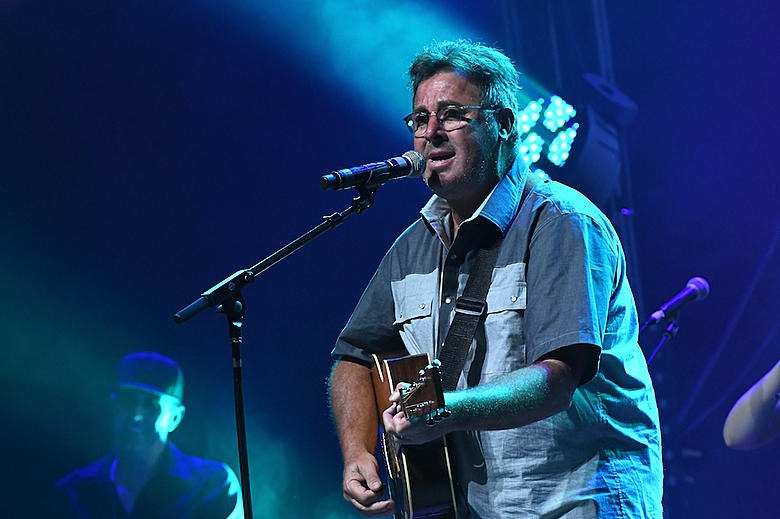Vince Gill’s Bold Stand: Staying True to His Faith on the Grand Ole Opry Stage
Vince Gill, one of country music’s most celebrated artists, has a career that reads like a dream. With over 20 albums, countless hits, and more Grammy Awards than any other male country singer in history, Gill has left an indelible mark on the music world. But beyond the accolades, it’s his integrity and unwavering faith that make him stand out—not just as a performer, but as a person.
Born in Norman, Oklahoma, in 1957, Vince Gill’s love for music began at an early age. His big break came in 1979 when he joined the country-rock band Pure Prairie League. After his stint with the band, he transitioned to a solo career in the 1980s, delivering hits that showcased his rich vocals, exceptional guitar skills, and heartfelt songwriting. By the 2000s, Gill was more than a country star; he was a legend, earning his spot in the Country Music Hall of Fame in 2007.
In recent years, Vince has leaned more into his gospel roots, blending his faith seamlessly into his music. But this choice hasn’t always been welcomed. Recently, when invited to perform at the legendary Grand Ole Opry in Nashville, Tennessee—a venue that has been the beating heart of country music since 1925—Gill was presented with an unexpected condition: he could perform, but he was forbidden from singing about Jesus.

The Grand Ole Opry Invitation and the Challenge
The Grand Ole Opry is no ordinary stage. For nearly a century, it has hosted the biggest names in country music. Artists dream of performing there, knowing it’s a symbol of tradition and excellence. For Vince Gill, stepping onto that stage wasn’t new, but the restrictions placed on him this time were.
As a devout Christian, Gill often incorporates gospel music into his setlists. To him, singing about his faith isn’t just a part of his career—it’s part of who he is. So, when told he couldn’t sing religious songs, he faced a tough decision: should he comply and perform non-religious songs, or should he stay true to his faith and risk breaking the rules?

Vince Gill’s Brave Decision
Rather than bow to the restrictions, Vince Gill made a bold choice. He stepped onto the iconic Grand Ole Opry stage and performed Kris Kristofferson’s powerful gospel song, “Why Me Lord.” The song, first recorded in 1972, is a deeply moving reflection on grace and redemption. Over the years, it has been performed by some of music’s greatest legends, including Elvis Presley and Johnny Cash. By choosing this song, Gill not only honored his faith but also paid tribute to the timeless connection between country music and gospel traditions.
As Gill’s voice filled the venue, the audience sat captivated. His heartfelt performance resonated deeply, transcending any controversy over the song’s religious content. By the time he finished, the crowd rose to their feet in a thunderous standing ovation. It was clear that Vince Gill had not only delivered a remarkable performance but had also reaffirmed the power of authenticity in music.
The Legacy of "Why Me Lord"

“Why Me Lord” is no ordinary song. Written by Kris Kristofferson during a moment of spiritual awakening, it has touched countless hearts over the decades. The lyrics express humility and gratitude for God’s grace, themes that resonate universally, regardless of one’s beliefs. Vince Gill’s rendition added another layer of emotion, as his personal connection to the song was evident in every note.
The performance also highlighted the deep ties between country music and gospel. From Hank Williams’ “I Saw the Light” to Johnny Cash’s numerous gospel recordings, many of country’s greatest artists have drawn inspiration from their faith. By choosing “Why Me Lord,” Gill reminded the audience of this rich tradition, bridging the gap between secular and spiritual music.
The Importance of Staying True to Yourself
Vince Gill’s decision to sing a gospel song in defiance of the imposed restrictions was more than a personal stand—it was a lesson in integrity. In an industry that often prioritizes commercial success over personal values, Gill’s choice was a rare and refreshing reminder of the importance of staying true to oneself.
For fans, it was a powerful moment. It showed that even someone as accomplished as Vince Gill isn’t afraid to take risks when it comes to his beliefs. His bravery inspired not only those in attendance but also the countless people who have watched his performance online.

The Broader Impact of Vince Gill’s Performance
Gill’s decision to sing “Why Me Lord” at the Grand Ole Opry sparked widespread discussion. Many applauded him for standing up for his faith, while others debated the appropriateness of imposing restrictions on an artist’s choice of material. Regardless of where people stood on the issue, one thing was clear: Vince Gill’s performance had struck a chord.
The standing ovation he received was a testament to the universal appeal of authenticity. The audience wasn’t just responding to the beauty of the song—they were responding to the courage it took for Gill to sing it. In a world where compromise is often the norm, his steadfastness was a reminder of the power of conviction.
Vince Gill’s Enduring Legacy

Vince Gill’s performance at the Grand Ole Opry is just one chapter in a career filled with unforgettable moments. Over the years, he has won fans not only with his music but also with his humility, kindness, and unwavering commitment to his values. Whether he’s singing about love, heartbreak, or faith, Gill’s music comes from the heart, and that’s what makes it timeless.
As he continues to perform and record, Vince Gill remains an inspiration to artists and fans alike. His decision to stay true to his faith, even when it wasn’t easy, is a reminder that success isn’t just about talent—it’s about character. And in Vince Gill, the world has a true artist who embodies both.
Conclusion: A Moment to Remember
Vince Gill’s performance of “Why Me Lord” at the Grand Ole Opry wasn’t just a musical highlight—it was a defining moment in his career. By choosing to sing a song that reflected his faith, he demonstrated the courage it takes to stand up for what you believe in. And in doing so, he created a moment that will be remembered not only by those who were there but also by fans around the world.
Gill’s story is a testament to the power of authenticity in music. It shows that, at its best, music isn’t just about entertainment—it’s about connection, meaning, and staying true to who you are. Vince Gill reminded us all of that, and for that, we applaud him.



